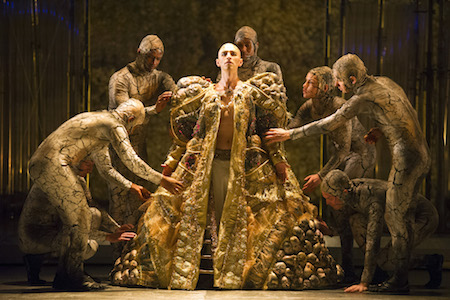Liliane Montevecchi, at 80, remains ageless and irrepressible, as her recent engagement at 54 Below proved. | COURTESY: BRETT OBERMAN
“I’m 80 years old and loving every moment of it!” cried Liliane Montevecchi to me in her exquisite leopard skin-lined jewel box of a Sutton Place apartment. “You know, sometimes people say, ‘You cannot tell your age and you cannot have another birthday!’ So I always tell them, ‘If you don’t want another birthday, you die!’ I mean, come on!”
This ageless diva, whom I mistook for her maybe 35-year-old assistant when she opened the door, just brought her irrepressible energy and joie-de-vivre to 54 Below and continues to tour the world. Her tale is an amazing one, from becoming a prima ballerina at 18 with Roland Petit’s company in Paris to being signed to one of the last seven-year MGM contracts and arriving in Hollywood like Alice in Wonderland — except people were a lot nicer to her. She admitted that after being a happy professional houseguest of the rich and famous for 25 years, she now “haaates” paying rent.
One star’s lucky life, another’s rotten love luck , a Loos gem, and a lesbian diva
“John Houseman had seen me in the ballet and asked if I would like a contract and, as Roland was closing the company and going with Leslie Caron, another dancer with us, to Hollywood, I accepted.
“Norma Shearer adopted me and I lived with her for a while. When she died, she gave me all her clothes. She was divine, divine, divine! A good heart, and after this extraordinary, glamorous life, she lived in a little house with a maid once a week. We had our table at Trader Vic’s, and her husband, Marty Arrougé, was French, so we were like two peas in a pod. He’d say, ‘Come on with me, because Norma doesn’t want to go in my Ferrari!’ He drove too fast for her and she was scared, so we drove all over Mulholland.
“He looked like [Shearer’s first husband, legendary producer Irving] Thalberg and she used to sometimes call him Irving. He didn’t mind. He was a ski instructor when they met on the slopes because she loved to ski.”
When Shearer died at age 80, she was blind and living in the Motion Picture & Television Fund’s retirement home.
“Her eyes were always bad,” Montevecchi recalled. “She had a little astigmatism and it was hard to photograph her, so everything was in profile because she had a great profile. But she was not obsessed with staying beautiful; she just didn’t want anybody to see her on the screen after a certain age because she wanted everybody to remember her from the last film she did when she was about 40. She didn’t want to grow old in front of the public. Otherwise, she was not obsessed.
“Every morning at 6 she would walk all around Bel Air for exercise when nobody was there. She used to go to this extraordinary man who was a tango instructor. She loved to tango, so she and Marty went three times a week. But she was not a woman to have her face pulled. She was what she was, but always loved fashion and retained her glamour.”
One of Shearer’s best friends was Merle Oberon, who “actually tried to commit suicide by throwing herself in front of my car because her lover, this famous doctor, had become my lover. She couldn’t understand how he could leave her for me.”
Montevecchi never married: “No, because I knew I would divorce them, so why marry? Because I knew I was not going to be faithful anyway. If you see one person all the time, you get cranky. It’s too monotonous, too boring.
“I’ve lived with a man now for 35 years, for the first time. He’s never there — he’s Italian, so he’s away in Italy. That’s why it’s lasted forever. I see him six months out of the year. Now it’s three months — as I get older, the time gets shorter! [Laughs.]”
The men certainly wanted Montevecchi, though, and I had to ask her about them.
Elvis Presley, her co-star in “Kid Creole”: “We were just pals. I like to choose my men if I go to bed with them but I don’t like them to choose me. So that’s it. But we were the same age, two kids, and he wanted to know about French recordings I had. He was with all his school chums on the top floor of the Wilshire Hotel and I used to go there and play cards and listen to French music.
Albert Lewin, her director in “The Living Idol”: “He fell in love in with me and one night came to my hotel room, saying, ‘I want to talk to you.’ Of course, I wanted direction, but he did something I didn’t like and then had a little heart attack in front of me. I didn’t know what to do because his wife was downstairs, and after that he refused to direct or even look at me. Most horrible experience I ever had, and it would have been a good chance for me. It was about reincarnation, an interesting script, and he was a brilliant man, but I don’t know why that happened.”
Jerry Lewis, with whom she did “The Sad Sack”: “Another one. He did the same thing with me. I don’t know what it is about me, but he also covered me in jewelry like, if you give jewelry, you will be loved. When I did ‘The Young Lions’ with Dean Martin, I asked him, ‘Where did you get that ring?’ ‘Jerry.’
“He wanted to give, give, maybe he wanted to be loved. But it was difficult to work with him because he’d be behind the camera making funny faces. He didn’t want to let go of this comic personality.”
Marlon Brando, also in “The Young Lions”: “I adored! We went to Spain together and he taught me how to act, to think about why I do something. But no affair. We slept together often, but I refused him because I didn’t want to be one of many. That’s why we lasted together because we were pals. He liked that and so did I. I was different, not some piece of meat who opened her legs and puff-puff. Ha ha ha!”
Montgomery Clift, also in “Lions”: “I used to take care of him. His doctor said, ‘You will be away with him in Europe and he cannot drink. If he has one drink, he will die.’ So I became his guardian and we drank milk for about two months.
“I don’t know why he drank, maybe he was tortured by his homosexuality. We didn’t discuss it, but I was there the night of his accident at that party because I lived with Liz Taylor. He got into his car and he was drunk, and then someone came running into the house to say he had smashed his car!
“Liz was divine, such a good heart and she loved to eat, also. She would make these enormous omelets everybody had to eat. She was so faithful and not with her nose up in the air.”
Tommy Tune was responsible for Montevecchi’s stunning comeback in “Nine,” for which she won the 1982 Tony, and also her Tony-nominated appearance in “Grand Hotel” seven years later.
“He called me up one night and said you have to watch this movie on TV with a great part for you!” she told me. “He did it because of me, but in Boston we had trouble because no one could understand my Russian accent on top of my French accent. Reviews were terrible and they wanted to fire me but Tommy said he would leave the show if they did that. So we just made the character French instead of Russian.”
“On that Tony night, my heart was beating so hard. My mother was in the audience so she could enjoy my triumph and that made me happy. I wanted to wear something a little unusual, so Marc Bouwer, who I discovered, made it for me. My God, to have the Tony and the Drama Desk, me a foreigner, and the American public accepting me — I was very touched by that.”
Asked what her secret to eternal youth is, Montevecchi declared, “I drink a lot of champagne and eat a lot of oysters!”
COURTESY: WILLIAM MORROW
The same day I interviewed her, April 3, I spent an evening with one of her old MGM fellow alums, Debbie Reynolds, who was being interviewed by Leonard Lopate at the 92nd Street Y, in conjunction with her new memoir, “Unsinkable.” Although admitting to health problems, like recent kidney failure and a mini-stroke, the star, though a tad under the weather vocally, did not disappoint her assembled longtime adoring fans, who all surely know by now that she is anything but the goody two-shoes she played onscreen in “Tammy” and “The Singing Nun.”
When Lopate asked exactly where her husband, Eddie Fisher, disappeared to on their honeymoon, she replied, “He was fucking Elizabeth!” Her new book takes up where her 1988 autobio left off, and includes a third hideous marriage to yet one more schmuck who took her money and ran. In fact, Reynolds should just steal my favorite book title of all time for her next memoir: “Hello, He Lied.” I bet Lynda Obst would consider the theft a high compliment.
Reynolds wished her final hubbie no end of bad will throughout the evening to the crowd’s delight and admitted to living alone now and loving it: “Oh to wake up in the morning in my own bed all by myself! No one there next to me — farting!”
Do not miss TACT’s revival of Anita Loos’ 1946 play, “Happy Birthday” which ends April 13 (The Beckett Theatre, 410 W. 42nd St.). Set in a New Jersey bar full of colorful drunks and misfits, it’s the kind of theater this town can do so right when it scores the proper cast, direction, and design, all of which are present here. Equally funny and touching, Scott Alan Evans has helmed it with grace and human observation, not to mention maybe the most breathtaking, surprising coup de theatre I will see this year. Mary Bacon is completely winning as Addie, the role Helen Hayes originated and won a Tony for.
Patricia Racette triumphed at 54 Below on March 29. | COURTESY: BRETT OBERMAN
One opera diva who can really cross over is out lesbian Patricia Racette, who triumphed with the Great American Songbook and other non-Verdian ditties at 54 Below on March 29. Dedicating each “chesty note” to her funny late mother, Jessie, who loathed opera and always begged her to “sing from your chest!,” Racette was both endearing and intensely melodic. She did a number of whopper chestnuts that have brought many a lesser singer to grief — “The Man That Got Away,” “Come Rain or Shine” (with an effective Bach-interpolated accompaniment by her very simpatico accompanist Craig Terry), “Not a Day Goes By,” “Guess Who I Saw Today.” She made each of them her own by virtue of her pleasing sound and obviously masterful technique (a sizable matter of breath control and support). And her French Canadian origins served her well, when a Piaf medley she performed— the 500th one I must have heard by now — actually thrilled. So I am grateful to Racette for helping me realize why so many love to do Piaf and how so very few truly can.
Contact David Noh at Inthenoh@aol.com, follow him on Facebook and Twitter @in_the_noh, and check out his blog at http://nohway.wordpress.com/.








































